Going to the doctor’s office was never fun, but it’s gotten worse lately, what with the rising medical costs, rushed appointments, and increasing uncertainty about which doctor you’re going to get this time.
Writers can find themselves in those offices more than they’d like, though, if they’re not careful. Full-timers, especially, spend hours at the computer, which can translate into a number of health problems. (Read more about the dangers of sitting here.)
There are steps we can all take on a daily basis to reduce our risk of weight gain, back pain, dry eye syndrome, carpal tunnel, and more. Most importantly, we can improve our long-term odds of avoiding the major diseases of our time: heart disease, cancer, and diabetes.
The 10 Things You Need
Check your office area. Do you have these ten health-promoting tools?
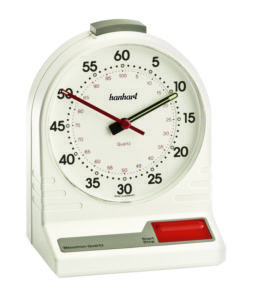 Timer: You can use any kind, but I’d recommend a desk timer that’s easy to operate and well within reach. Set it for 30 minutes. When it goes off, get up! Doesn’t matter what for. Get a drink of water. Walk around. Do a few jumping jacks. The important thing is to get up out of your chair and move. The timer will help remind you. When you sit back down, set it for 30 minutes again.
Timer: You can use any kind, but I’d recommend a desk timer that’s easy to operate and well within reach. Set it for 30 minutes. When it goes off, get up! Doesn’t matter what for. Get a drink of water. Walk around. Do a few jumping jacks. The important thing is to get up out of your chair and move. The timer will help remind you. When you sit back down, set it for 30 minutes again. Small water glass: Speaking of getting up—the smaller your water glass (or tea and coffee cup), the more often you have to get up to refill it. Café Press has some adorable ones specifically for writers (shown here), but even these are a bit large. Try filling them only halfway. Same for your coffee cup—Zazzle has some great ones. Use it and get up and refill it!
Small water glass: Speaking of getting up—the smaller your water glass (or tea and coffee cup), the more often you have to get up to refill it. Café Press has some adorable ones specifically for writers (shown here), but even these are a bit large. Try filling them only halfway. Same for your coffee cup—Zazzle has some great ones. Use it and get up and refill it!- Gym membership (or equipment): However you get exercise into your day, make sure you get it in. I’ve been a health writer for nearly 20 years and I’ve learned that if there’s one fountain of youth, it’s exercise. There’s nothing else that measures up quite as well as far as keeping you healthy and disease-free. For writers, particularly, who tend to be sedentary while working, exercise is a non-negotiable! Find something that works for you and do it at least five days a week. Even a pair of walking shoes will fit for this one.
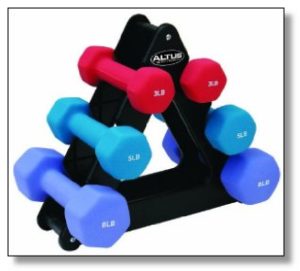 Weights: This goes along with #3, but it’s different. We all lose muscle as we age, especially when we’re not doing anything more strenuous than typing on the keyboard (or writing on a piece of paper). I have recently gone ape over hand weights. A set like those pictured here can rest by your desk where you can pick them up and use them anytime. Simply lift them up over your head, do some bicep curls, or try these exercises you can do at the desk. Then I’d recommend getting more serious with some other lifting as well—studies show repeatedly that keeping your muscles in shape helps reduce your risk of disease, keeps you looking toned, protects your joints, improves balance, and helps you burn more calories. You don’t have to go crazy and be a body-builder, but trust me—when you see and feel your muscles coming back, you’ll be hooked.
Weights: This goes along with #3, but it’s different. We all lose muscle as we age, especially when we’re not doing anything more strenuous than typing on the keyboard (or writing on a piece of paper). I have recently gone ape over hand weights. A set like those pictured here can rest by your desk where you can pick them up and use them anytime. Simply lift them up over your head, do some bicep curls, or try these exercises you can do at the desk. Then I’d recommend getting more serious with some other lifting as well—studies show repeatedly that keeping your muscles in shape helps reduce your risk of disease, keeps you looking toned, protects your joints, improves balance, and helps you burn more calories. You don’t have to go crazy and be a body-builder, but trust me—when you see and feel your muscles coming back, you’ll be hooked. Journal: Studies have found that those who regularly use a journal or diary are more likely to better manage stress—and we all know how stressful a writer’s life can be. On top of that, journaling can help reduce the amount of worrying you do, according to another study. Expressive writing reduces intrusive thoughts, improves working memory, and frees up brain power needed to deal with stressful events. Keeping a journal also helps you get in touch with your inner, creative voice.
Journal: Studies have found that those who regularly use a journal or diary are more likely to better manage stress—and we all know how stressful a writer’s life can be. On top of that, journaling can help reduce the amount of worrying you do, according to another study. Expressive writing reduces intrusive thoughts, improves working memory, and frees up brain power needed to deal with stressful events. Keeping a journal also helps you get in touch with your inner, creative voice.- Healthy snacks: Who among us can sit for hours at the computer without something to snack on? Unfortunately, we often choose unhealthy items like candy, chips, cookies, and the like. Try this list of healthy munchies for better ideas. Some healthy options: nuts, cut-up fruits and veggies, pickles, yogurt, tea, sunflower seeds, popcorn, and (a small amount of) dark chocolate.
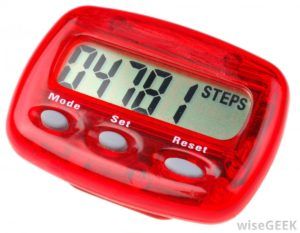 Pedometer: Again, this is to get you up and moving. How many steps have you completed today? If you actually measure them, you may be really surprised. (I was!) There are several items on this list meant to get you up and moving more often. That’s because recent studies have informed us of the extreme danger of sitting for hours at a time (increased risk of several diseases and early death). So strap on the pedometer. It will help measure your progress, which is really motivating when you’re trying to get healthier.
Pedometer: Again, this is to get you up and moving. How many steps have you completed today? If you actually measure them, you may be really surprised. (I was!) There are several items on this list meant to get you up and moving more often. That’s because recent studies have informed us of the extreme danger of sitting for hours at a time (increased risk of several diseases and early death). So strap on the pedometer. It will help measure your progress, which is really motivating when you’re trying to get healthier.- Eye drops: Staring at the computer dries out your eyes. Over time, it actually changes the makeup of your tears to be less efficient at keeping eyes moist. (Read more about dry eyes here.) Keep some moisturizing drops (avoid anti-redness drops) near your desk and apply them when needed. Your timer will also help get you up and away from the screen, where you can look at something in the distance instead of up so close all the time.
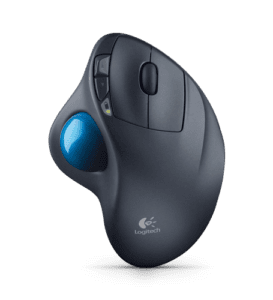 Ergonomic mouse: Using a regular mouse can potentially increase your risk of carpal tunnel over time. Make sure you have the best ergonomic set-up you can get at your desk (this is key for avoiding carpal tunnel and back pain!) and experiment with mice until you find one that requires little movement and keeps your hand relaxed. I love the trackball shown here because my whole hand can rest easily while just my fingers move.
Ergonomic mouse: Using a regular mouse can potentially increase your risk of carpal tunnel over time. Make sure you have the best ergonomic set-up you can get at your desk (this is key for avoiding carpal tunnel and back pain!) and experiment with mice until you find one that requires little movement and keeps your hand relaxed. I love the trackball shown here because my whole hand can rest easily while just my fingers move.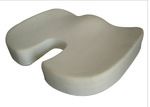 Cocci cushion: This has a funny name, but it can save your back. All those hours in the chair put pressure on your spine, which equals back pain over time. Use this cushion and you allow the spine and tailbone to rest suspended, without all that pressure. I can work twice the hours using this cushion as I can without it. Shop around to get a good quality cushion—some flatten out really quickly and then they’re no good.
Cocci cushion: This has a funny name, but it can save your back. All those hours in the chair put pressure on your spine, which equals back pain over time. Use this cushion and you allow the spine and tailbone to rest suspended, without all that pressure. I can work twice the hours using this cushion as I can without it. Shop around to get a good quality cushion—some flatten out really quickly and then they’re no good.
Please don’t be afraid to invest in yourself. Your health is key to your continued work as a writer.
Do you have other must-have tools for staying healthy as a writer? Please share your tips!
Source
Siri Carpenter, “A new reason for keeping a diary,” American Psychological Association, 2001, http://www.apa.org/monitor/sep01/keepdiary.aspx.


Excellent tips. I suffered a painful condition called shoulder impingement a couple of years ago. The condition is gradual, but the onset seems sudden and it is very painful. I could not lift my arm above my head without excruciating pain in the shoulder joint. I thought I torn rotator cuff but as it turns out it was something that was as nearly as bad and sometime The condition is gradual, but the onset seems sudden and it is very painful. I could not lift my arm above my head without excruciating pain in the shoulder joint. I thought I torn rotator cuff but as it turns ou, poor posture and failure to stretch or take breaks was the source of the problem. This is what I learned in physical therapy: the distance between the chair height, desk and floor is important. Sitting for brief periods on a large inflated exercise ball can help maintain core strength, however these balls are not meant to be used for hours per day. I have a rounded foot cushion that I rest my feet on so that I can keep my chair slightly higher to create the perfect balance between desk height, keyboard & wrist positions, etc. The foot cushion I bought was approximately $25 on Amazon and it was well worth it. It takes the strain off of my hips and knees when I am sitting in the chair. I tried a standing desk (stationary), but women tend to lock their knees so I developed a ligament issue in one knee from standing too long. Stretching is another excellent tool. My physical therapist told me to put my hands on either side of an open doorway and step just a few inches forward to stretch out my pectoral muscles. There is no forcing involved, just a gentle stretching of the arms/shoulders which are braced against the open door. Helps immensely. Stretching the arms behind the back and doing some yoga exercises will help prevent this extremely painful condition. Yoga is an excellent tool for strength, endurance, and posture. Large-busted women may also find a support bra made by Intelliskin to be a good investment ($100) because the bra pulls the shoulders back and fights against shoulder rounding which causes shoulder impingement. I spent approximately $1500 in physical therapy costs to correct this problem, when one $100 bra (along with simple routine stretching) may have helped prevent it. Thanks again for the great info. Happy (Healthy) writing!
Thanks Gabrielle. You have some great tips here! I’m with you on the yoga. It saves me. Hope you continue to recover and do well.
Wonderful suggestions. As a college athlete I really respect the importance of maintaining a healthy lifestyle. It can be the difference in accomplishing your goals or falling short. It’s difficult to be productive when you don’t feel your best.
So true, Victoria. I know when I’m dragging and feeling poorly my writing suffers. Thanks for the input.
Great suggestions! I’m with you on lifting weights- even a little lifting gets you quick results that are really motivational. I like the idea of using a smaller cup to force myself to get up to refill it. That would be a bonus since my faucet is upstairs from my office.
Oh definitely! You’d get some stair-work in easily! Thanks, Chere.